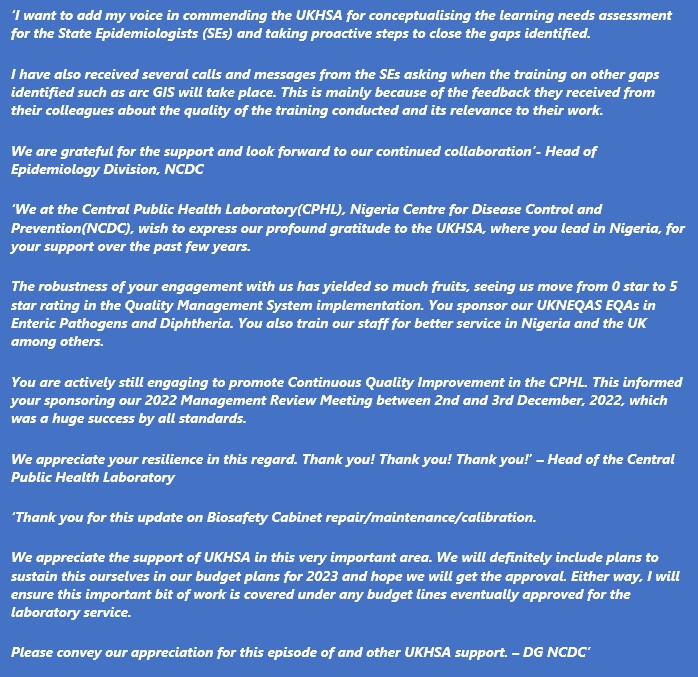
KEY ACHIEVEMENTS | BACKGROUND | THE NIGERIA EXPERIENCE | CHALLENGES | INTERVENTIONS AND OUTCOMES | KEY LEARNINGS
Key achievements
|
Background
The role of workforce development in any organisation cannot be separated from the certainties governing its value system, mission and vision and other contextual requirements instrumental to achieving its goals. With the emergence and re-emergence of infectious diseases of public health importance globally and locally, there has been a gradual shift to recognising the positive impact of a skilled workforce and human capital development in National Public Health Institutes (NPHIs) in terms of addressing global pandemics.
The commitment of NPHIs such as the Nigeria Centre for Disease Control and Prevention (NCDC) in improving capacities in key priority areas such as IHR Coordination and Human Resource cannot be over-emphasised; supporting and ensuring the implementation of the Country’s National Action Plan on Health Security (NAPHS) across technical areas.
UK Health Security Agency’s (UKHSA) IHR Strengthening Project has a Memorandum of Understanding in place with the NCDC, the IHR Focal Point for Nigeria. (Source: Country-led (NCDC) Midterm Joint External Evaluation of IHR Core Capacities Report: November 18 – 22, 2019.)
The Nigeria Experience
The testimonials from beneficiaries of the contributions of the UKHSA IHR Strengthening Project’s interventions and support in Nigeria with the NCDC have been very positive. These include but are not limited to the areas of Surveillance, National Laboratory System, Chemicals Events, One Health/Zoonotic Disease and Human Resource (HR). Below are snippets of testimonials from Top-level management of the Agency including the Director General, NCDC:

Amongst the technical expertise and skilled workforce that the various departments of the NCDC continue to build in the prevention, detection, and response to public health events lies a sub-optimally skilled group, the Administration and Human Resource Department. This weakness which had been highlighted by the previous and current Directors General led to the UKHSA IHR Strengthening Project deploying an embedded resource to further strengthen the department in line with two of the core mandates of the project around capacity building and system strengthening.
Challenges
The facilitation of ownership of institutional objectives, core values, and other contextual realities in an organisation can only be strengthened when the Human Resource is equipped to meet such demands of the organization. Against the backdrop of the aforementioned, UKHSA IHR Strengthening Project through an embedded Technical Advisor on Organisational Development and Human resource, conducted a gap analysis and the findings were as follows:
a. The Admin/HR workforce which forms an integral part of the Institute was inadequately equipped to manage the vicissitudes of contemporary HR Practice.
b. None of the workforce of more than twenty in the Admin and HR department had undergone any form of training or skills mapping exercise to assess professional capacity which could inform needed development.
c. The majority of the workforce of NCDC had limited or no knowledge of the operations, processes, and procedures of the public service rules and guidelines governing the public health sector.
d. The above posed a threat to the implementation of the organisation’s strategic goals and other global benchmarks relating to its mandate.
Interventions
Essential findings from the gap analysis resulted in the deployment of resources by the IHR Strengthening Project on building capacity and capability; strengthening the workforce of the Administration/Human Resource Department to have ownership of operational and strategic activities within their job purview as well as bridging the workforce grade level gaps within the department as a component tool in Strategic Human Resource intervention. Part of the interventions include:
- Synergising with accredited professional institutes such as the Chartered Institute of Personnel Management of Nigeria.
- Engaging the Administrative Staff College of Nigeria (ASCON) to ensure that the professional development of the workforce is further strengthened.
- One-on-one mentoring and training of the Administration/HR workforce by the UKHSA embedded resource and support from the UKHSA Project Support Officer, to further develop capacities on contemporary Human Resource Information Management System (HRIS) and Matrix to guide analytical decisions for the organisation.
- Designing and developing a workforce analytical outlook for succession planning imperatives to guide the organisation on the need to invest and develop the capacities of the next-generation leadership cadre.
The outcome of interventions deployed
Against the backdrop of the extensive support of the UKHSA IHR Strengthening Project embedded resource, the Admin/HR workforce can now develop and review relevant policies for the NCDC. These policies include whistleblowing policy and grievance procedure, asset management and maintenance policy, exit management and offboarding policy, travel policy, disciplinary action policy, onboarding policy and fire safety policy.
In addition, the workforce has been trained to design and draft their individual job descriptions and develop their strategic objectives and key result areas in alignment with the NCDC strategic plan. The workforce has also been playing a vital role in the development of the next iteration of the strategic plan of NCDC (2023-2027). Furthermore, half of the workforce have undergone professional development with the Chartered Institute of Personnel Management (CIPM) in the last 12 months.
Learning and Opportunities
Despite these achievements and innovations delivered within this short period of time, organisational development and Human Resource are still regarded in many public health institutes in low/middle income countries as adjuncts to the specialised workforce; only needed as enablers to respond in emergency situations and not as an integral part of the prevention, promotion, detection, and response to public health events. To this end, there is the need to elevate public health conversations around workforce planning, organisational development, and Human Resource to ensure that they are core in comprehensive strategic planning for public health institutes thus, developing sustainable public health networks across the value chain of public health global operations.
By Paul Irabor